Groundbreaking victory in Hoshino state compensation lawsuit
The Tokyo District Court acknowledges the government’s responsibility for the death in prison
March 26, 2025
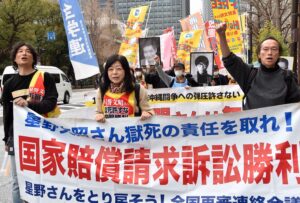
A demonstration against the Ministry of Justice was held from noon before the ruling. Comrade Fumiaki Hoshino’s wife, Akiko, took the lead
On March 24, the Tokyo District Court ruled on the lawsuit for state compensation filed by the family of comrade Fumiaki Hoshino, who fought in the Shibuya Struggle to prevent the ratification of the Okinawa Reversion Agreement on November 14, 1971, and was framed-up for “murder” and forced to die in prison while serving indefinite term imprisonment sentence. The Presiding Judge Takayuki Suguri of the 14th Civil Division of the District Court found that the defendant, the state, had neglected to provide proper medical treatment, and handed down a ruling ordering that the state pay to the plaintiffs, Akiko Hoshino and Fumiaki Hoshino’s two brothers, a total of approximately 22 million yen in damages. The court recognized that comrade Hoshino’s life was taken by the Tokushima Prison, which knew that comrade Hoshino was suspected to have liver cancer but concealed it, and by the Medical Correction Center in East Japan, which neglected to provide proper post-operative care after his surgery. The five-year struggle for state compensation has been a series of victories by the plaintiffs, their legal team, and the supporters, and these victories have now been finalized. This is a groundbreaking victory.
Comrade Hoshino, an irreplaceable warrior who had been at the forefront of the struggle since the anti-Anpo (Japan-US Security Treaty) and Okinawa protests around 1970, would not have lost his life if he had received the medical care he deserved. We are filled with anger once again at his murder by the state power.
Medical Correction Center in East Japan found to have committed a serious “breach of duty”
The ruling first clarified the responsibility of the Medical Correction Center that performed comrade Hoshino’s surgery. The liver cancer resection surgery was performed on May 28, 2019, and afterwards, the medical director of the center told Akiko, “The surgery was successfully completed.” However, at 6:50 p.m., two hours after the end of the surgery, his blood pressure, which had been in the 120s until then, dropped to 64. He also stopped urinating, and he said something that suggested delirium, such as “I see many white horses.” The doctor had the duty to suspect postoperative bleeding and to take action, such as conducting tests.
A liver surgery specialist who submitted an opinion and testified in court said, “Serious situations most often occur on the day of surgery.” However, the surgeon who was invited from outside because of his “high skills” left immediately after the surgery, and there was no on-call system to call him back in the event of an emergency. Furthermore, the surgeon who assisted in the surgery also left after 8 p.m. When Hoshino was hovering between life and death, the only person left at the Medical Correction Center was the anesthesiologist on duty. When asked about this, the specialist replied indignantly, “If it were me, I wouldn’t go home.” As a result of negligence of all these measures, comrade Hoshino died on May 30. This was a very murder by the state.
The ruling clearly stated “the Medical Correction Center’s doctors breached their obligation to take measures to stop the bleeding, etc.” and “if they had taken the above-mentioned duty of care, it is recognized that there was a high probability that he would have been alive as of May 30.”
The Tokushima Prison warden condemned for illegal “concealing of information” from the Parole Board
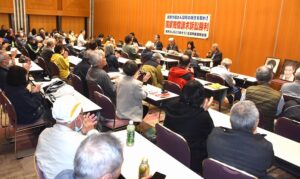
The meeting in the Bar Associations Building after the ruling. Everyone rejoiced at the victory, and a big round of applause was given to the attorneys and Akiko Hoshino.
Secondly, the court also went further in judging the responsibility of the Tokushima Prison warden.
Comrade Hoshino collapsed with severe abdominal pain in August 2018. The prison doctor, however, diagnosed the illness as “stomach cramps” and had him rest in the hospital for just one day before returning to prison work. He continued to lose appetite and weight after that, and despite repeated requests from his worried family and legal team, Tokushima Prison did not conduct a detailed examination.
At long last, on March 1, 2019, an ultrasound examination was finally conducted; a tumor was found in his liver, and the doctor wrote in the medical record, “CT scan required.” This doctor testified that he had reported the matter regarding comrade Hoshino to the warden on the same day. At the “Prison Officers’ Meeting (Executive Meeting)” on March 6, the warden instructed, “Hoshino has a complicated background, so deal with him cautiously;” in plain English, “Do nothing!” For this same reason, the warden did not notify the Shikoku Regional Parole Board, which was then conducting the parole hearing, of Hoshino’s physical condition.
Comrade Hoshino’s parole hearing had begun based on the Ministry of Justice’s notice of March 6, 2009, that the regional parole boards have obligation to start examination for parole concerning inmates who have been incarcerated for 30 years. Article 7 of the Regulations for Treatment in the Community under the Offender Rehabilitation Act requires the prison warden to notify the parole board when there are changes in the mental and physical condition of a prisoner. However, the warden did not notify them. He did not tell comrade Hoshino himself, his family, or his legal team. The court recognized the illegality of such omissions and ordered the payment of compensation.
At that time, the Shikoku Regional Parole Board was in the middle of the hearing for Comrade Hoshino’s parole, which was the nationwide focus of the big struggle for his parole initiated two years prior to the hearing. Two large rallies were held in Takamatsu City, Tokushima Prefecture, and a movement calling for “immediate
release of Mr. Hoshino” was ongoing. It is no exaggeration to say that the warden was newly appointed to the Tokushima Prison to deal with this movement. They concealed important information and, after making sure that the Parole Board had made the decision on March 25th that “parole would not be granted,” they began the process of transferring comrade Hoshino to the Medical Correction Center.
The ruling acknowledged that Comrade Hoshino’s “right to expect that his parole hearing would be conducted properly” was violated. Although this is insufficient, it is decisive in that it condemns the illegality of the Tokushima Prison warden.
However, the ruling did not acknowledge the responsibility for Tokushima Prison’s failure to provide comrade Hoshino with sufficient testing and treatment. If a detailed examination had been conducted in the fall of 2018, the liver cancer could have been found in about half the volume. It would have been possible to perform the surgery more safely; comrade Hoshino would still be fighting with us.
Angry demonstration against the Ministry of Justice, leafleting and speech in front of the District Court and packed courtroom with militant spectators
On this day, supporters including the National Hoshino Defense Committee made a demonstration against the Ministry of Justice from just after noon, and leafleting and speech in front of the Tokyo District Court from 1:00 pm. About 100 people, twice the number of spectators, lined up for the lottery. Akiko Hoshino and Comrade Hoshino’s brother Haruo sat in the plaintiff’s seats. When the presiding judge first read out the conclusion of ruling, applause broke out at the clear victory. There were cheers of joy that the victory of the state compensation struggle could be delivered to late comrade Hoshino.
At the press conference and report meeting, 80 people, including those who were unable to enter the courtroom, gathered after the trial and shared their joy. The lawyers representing the plaintiffs, Makoto Iwai, Motoya Tsuchida, Joji Fujita, and Osamu Wakuda, reported and explained the significance of the ruling. Akiko expressed her determination, “This ruling makes the government’ responsibility clear for Fumiaki’s death. The ruling stated that if the government had acknowledged its responsibility and stopped the bleeding, Fumiaki would have been here today. The ruling also admitted the Prison’s violations of the notification obligation to the Shikoku Regional Parole Board. I’m really happy. I’ll consider whether to appeal or not. I’ll fight to the end.”
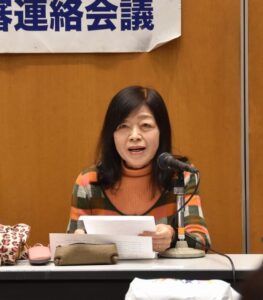
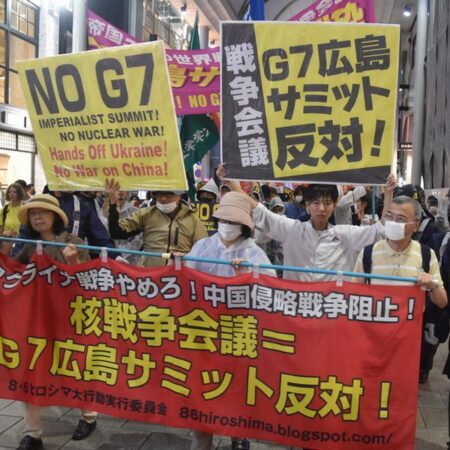
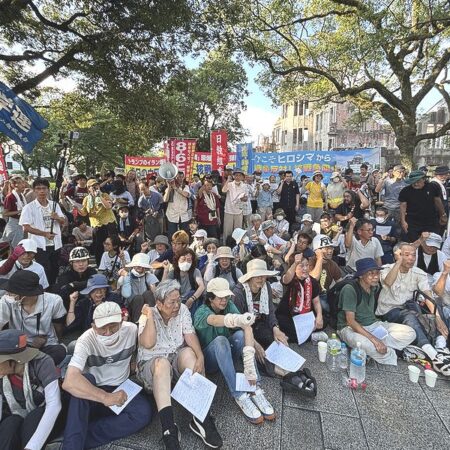
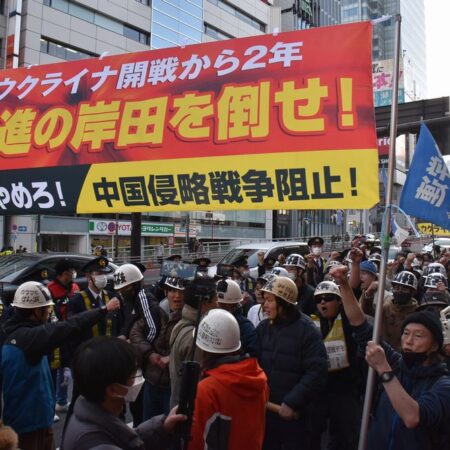
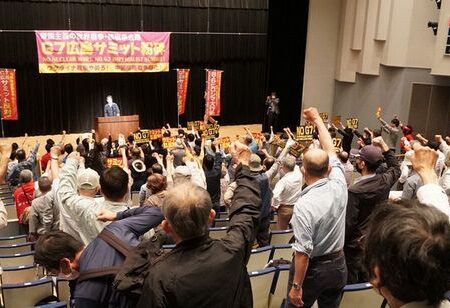
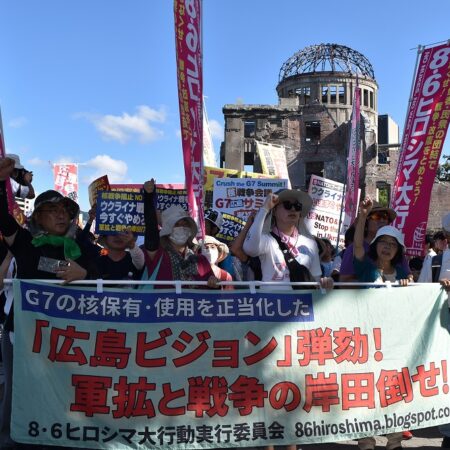
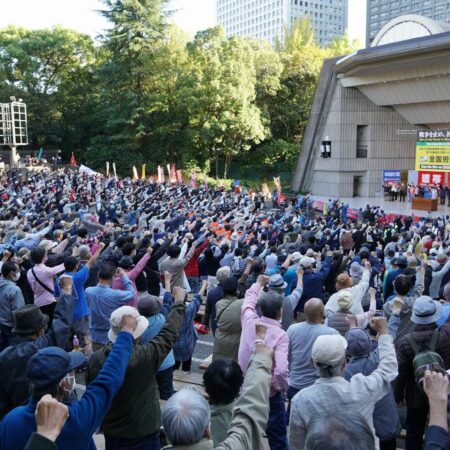
この記事へのコメントはありません。